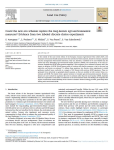Anougmar S., Fockaert L., Michiel K., Van Passel S., Van Schoubroeck S. (2025). Could the new eco schemes replace the long-known agri-environmental measures? Evidence from two labeled discrete choice experiments. Land Use Policy, 01/06/2025, vol. 153, p. 107525.
https://doi.org/10.1016/j.landusepol.2025.107525
https://doi.org/10.1016/j.landusepol.2025.107525
| Titre : | Could the new eco schemes replace the long-known agri-environmental measures? Evidence from two labeled discrete choice experiments (2025) |
| Auteurs : | S. Anougmar ; L. Fockaert ; K. Michiel ; S. Van Passel ; S. Van Schoubroeck |
| Type de document : | Article |
| Dans : | Land Use Policy (vol. 153, June 2025) |
| Article en page(s) : | p. 107525 |
| Langues : | Anglais |
| Langues du résumé : | Anglais |
| Catégories : |
Catégories principales 06 - AGRICULTURE. FORÊTS. PÊCHES ; 6.2 - Politique AgricoleThésaurus IAMM AIDE AGRIENVIRONNEMENTALE ; POLITIQUE AGRIENVIRONNEMENTALE ; PAC ; POLITIQUE DE SOUTIEN ; EUROPE |
| Résumé : | In the context of the most recent reform of the European Common Agricultural Policy (2023-2027), new voluntary environment-friendly measures have been introduced. These measures, termed eco-schemes, represent one-year arrangements with limited restrictions. They are, therefore, considered to be more flexible than the revised and more demanding agri-environment-climate measures (AECM). The introduction of the new eco-schemes, alongside the AECM, raises questions regarding 1) the acceptance of eco-schemes by farmers, and 2) the impact on adoption of AECM. Would farmers prefer to continue with familiar measures or opt for the new, less restrictive, and shorter eco-schemes? To address these questions, two discrete choice experiments (a stated preference method) were conducted on a sample of 360 farmers with previous AECM experience. These experiments focus exclusively on grassland-related measures, as they are available in both contract forms, eco-schemes and AECM. The results reveal a general aversion to voluntary agri-environmental measures. However, farmers are more inclined to implement the new eco-schemes rather than the more familiar AECM, especially when the compensation of the latter is conditional on the environmental results. The findings also emphasize the impact of restrictions and the flexibility of the contract on farmers' decision-making processes, particularly when dealing with result-based AECM. |
| Cote : | En ligne |
| URL / DOI : | https://doi.org/10.1016/j.landusepol.2025.107525 |







